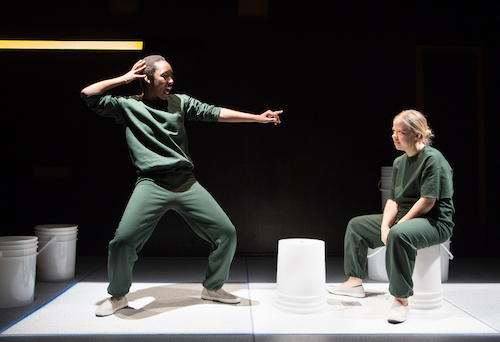 A fascinating, keenly-observed new play by Charlotte Corbeil-Coleman is now on stage in Toronto
A fascinating, keenly-observed new play by Charlotte Corbeil-Coleman is now on stage in Toronto
“What do you like?” Bubbly inmate Britt (Virgilia Griffith) asks this of wary new transfer Sid (Vivien Endicott-Douglas) in the first moments of Guarded Girls, by Governor General Literary Award-nominee Charlotte Corbeil-Coleman, now playing at the Tarragon Extraspace in association with Green Light Arts. Nineteen-year-old Sid, who has been bounced around from prison to prison for her aggressive behaviour, likes cramming packs of gum into her mouth, long-necked giraffes, and pretending to be other people. It’s better than being herself.
Through the games Sid convinces Britt to play, it quickly becomes clear that the “Guarded Girls” of the title refers not just to the state of surveillance the prisoners are under, but their – Sid’s, in particular – reluctance to trust others and to tell their full stories, preferring to hide behind the personas of their fellow inmates and “screws” (guards). Britt is studious, romantic, and claims to be totally innocent. Sid claims to be rough, crude, and bad to the bone, but there’s clearly something more going on underneath. Make-believe is a powerful escape, but one that can’t last forever; when they do bare their souls, it all comes pouring out.
Sometimes, it pours out in the creation of bonds that are equally strong and temporary, women clinging to each other like a human life raft. Sometimes it manifests in impotent fury at the futility of existence in a brutal, unfeeling system designed for retribution. As if on cue, these explosions immediately result in visceral, disturbing scenes of violence meted out by the tune-humming prison guard (Columpa C Bobb), who knows her own power and uses it.
The angular set (Joanna Yu) of director Richard Rose’s fast-paced production is mostly white with black accents, cells delineated by lighting cues and doors invitingly lit but out of reach. The visual stars of the space are the buckets that continuously multiply, brought in and inspected by the guard, which occasionally reveal contraband or treasures as the women “shed” important and inconsequential things alike.
The set may be black and white, but the characters are anything but. The guard isn’t just a figurehead for an unjust system, and the prisoners aren’t simply victims of it, or reprobates requiring its corrective barrage. Corbeil-Coleman is an extremely talented writer; her dialogue sparkles, and her characters feel well-rounded and human. In particular, Britt and Sid are captivating, a masterclass in building a relationship that’s both warm and guarded, angry and vulnerable, bright and funny and deeply sad. Both actresses are stellar in fully inhabiting their characters and in adopting the personas of the women around them, physically and vocally; we never get to see most of these other characters, yet they still feel like sharply-observed impressions.
The magic created by the first part of the play actually works against the rest of it. While the first 45 minutes or so of the play are spent with Britt and Sid in a world that feels very real, it suddenly undergoes a large stylistic and tonal shift to an extended monologue by a different inmate.
Funny, wanderingly philosophical, blunt and unstable, Kit (Michaela Washburn) grinningly winks at the audience, both abruptly breaking the fourth wall and hinting that we’re a manifestation of mental illness. She further highlights the drastic inequalities and unfair, vicious cycle that is the prison system, going to desperate lengths to see a special visitor. The monologue cranks up the drama and allows Washburn to ably show off a full range of emotion in her lively, manic eyes, but it’s a little repetitive, and could easily be condensed.
The play comes together in an intricate fashion in the third segment, with children demonstrating how the cycle of pain, desperation and crime completes and renews itself. The ends are skillfully, empathetically woven together, though you might have to draw a diagram to make sure you’re connecting the time periods and relationships correctly, as some actors play the same characters consistently and some do not.
Everything the play does, it does well; as interwoven as it is, however, it still gives the impression of being two separate pieces. The first section of the play feels like it’s showing the play’s message through character relationships, and the second and even the third to some extent feel like telling, where the characters now talk at us instead of to each other. Though monologue can be just as vital as representational theatre, and the play continues to up its dramatic ante throughout, the nature of this difference in delivery unbalances the energy between the two halves, and the show never quite recaptures its urgency.
That being said, Guarded Girls is still a fascinating, keenly-observed, and gut-wrenching new play, with a first half that sets us ashore in a brave new world, and a second half as bracing as a stint in solitary.
Details:
- Guarded Girls runs until May 5, 2019, at the Tarragon Extraspace (30 Bridgman Ave)
- Shows run Tuesday-Saturday at 8:00PM, with select Wednesday 1:30 and Saturday-Sunday 2:30PM matinees.
- Tickets are $29-55 and can be purchased online, by calling 416-531-1827, or in person at the Box Office.
- The show runs approximately 90 minutes without intermission, and contains mature language, scenes of violence, and nudity.
Photo of Virgilia Griffith and Vivien Endicott-Douglas by Cylla von Tiedemann
